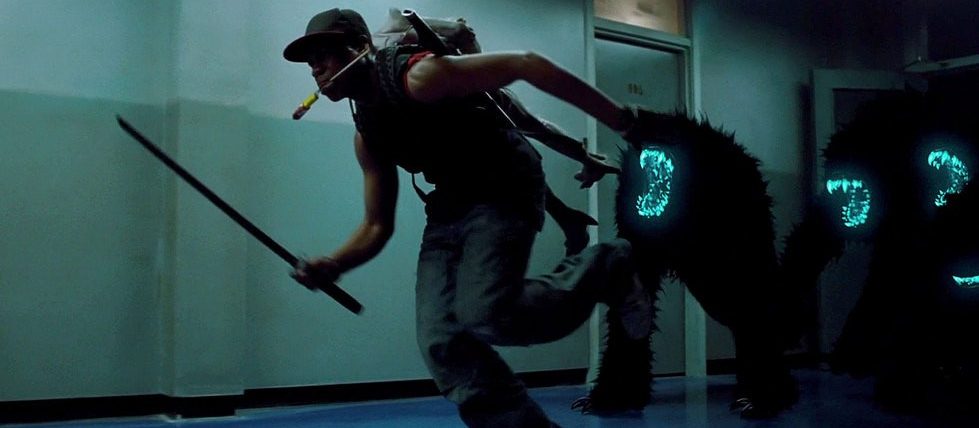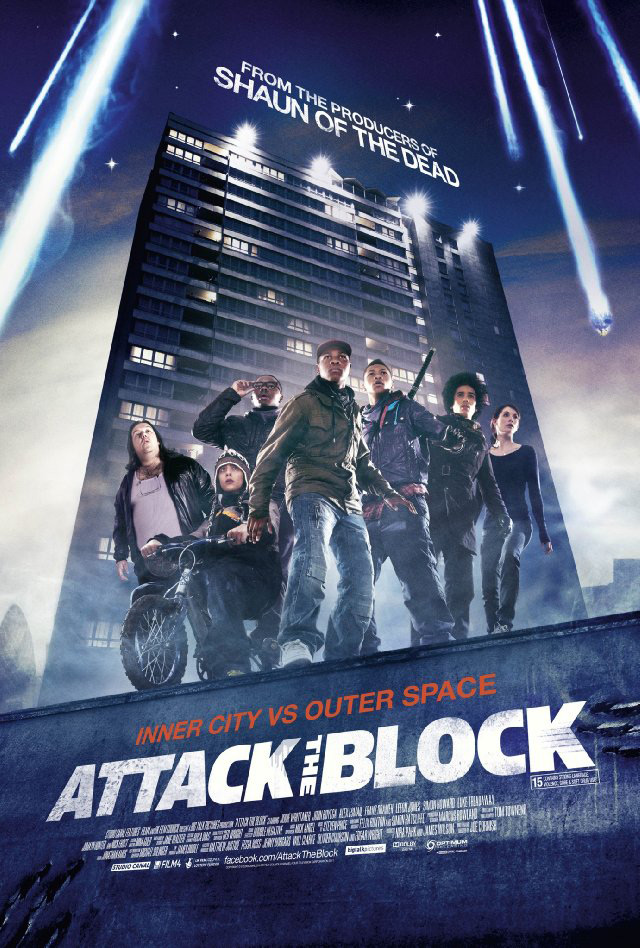

“You’d be better off calling the Ghostbusters, love.”
Attack the Block was executive produced by Edgar Wright. Nick Frost, who co-starred in Wright’s Cornetto Trilogy, plays a minor role as a local weed dealer. These facts indicate the most sensible reference point for Joe Cornish’s debut feature. The urban sci-fi thriller fits right in with Wright’s three delectable films—Shaun of the Dead, Hot Fuzz, and The World’s End—with a fresh mix of raunchy comedy, social commentary, and genre tropes. But where those films were smart spoofs of genre classics, Attack the Block feels modern—certainly indebted to its forebears, but doing something new as well. Drawing equal inspiration from the sci-fi of Steven Spielberg and the slasher flicks of John Carpenter, the film is packed with British lingo, techno and rap, jump scares, and good mix of practical and visual effects. It’s an offbeat thrill ride that’s so much fun that it’s not really worth it to poke holes in the faulty logic and inconsistencies.
The basic premise is that aliens crash land in a very small area of Britain, and some teenage punks fend them off. That’s it—we never zoom out, we never see things from the point of view of a government official or a police chief, we don’t get to see the news. There are no military choppers or flying saucers. Just aliens crash landing near a high rise apartment building and some youngsters fighting for their lives. In addition to our group of punks, there’s a woman who lives in their building, some young ladies that the boys fancy, a drug lord, two ten year olds, and a couple of stoners, but it’s very small scale and immediate, kind of like a localized Cloverfield but without the gimmicky camerawork. We follow the exploits of this small group of characters, and that’s it, but that’s enough. Cornish and editor Jonathan Amos do a splendid job of generating a breakneck pace that quickly moves us along to the various action sequences, using these intense scenes to develop the characters and setting and wringing a smooth 90 minutes out of a limited scope.
The film opens in media res and never lets up. When we first encounter our hero, Moses (John Boyega), we’re supposed to fear him, or at the very least view him with contempt. The first character we meet is an innocent nurse named Sam (Jodie Whittaker) who is walking home by herself on Guy Fawkes Night amidst showers of fireworks. Soon, she finds herself surrounded by a group of young men with their hoods up and bandanas covering their faces. Their leader is Moses, a young thug without a face—all we see are his frightening eyes. He pulls a knife on her and demands that she hand over her purse and her ring. Even when a fireball explodes in the car next to them and Sam escapes, and we subsequently witness the boys hunting down and killing the feral alien creature that was contained in the meteorite, we don’t really think of Moses as a hero—just a guy who can handle himself in a scuffle and has the weapons on hand to do so.

I really like the gutsy opening. Initially painting Moses as an anonymous gangster gives plenty of room for a change in character, as well as our perception of him, which is an admittedly tough thing to do in an action-oriented film. When we witness him baring a knife at Sam, we haven’t yet seen him display any leadership traits, or loyalty to his friends, and the gorilla-wolf-aliens haven’t yet become “the enemy” that causes the angsty teens and the scared nurse to find common ground. By the film’s climax Moses is completely different—instead of aspiring to become the protégé of a gangland drug lord who grows weed under halogen lamps in his secure flat, he’s willing to sacrifice himself for the safety of his community. In this way, Attack the Block raises some interesting questions about redemption, first impressions, and the scales of good and evil, but does so without ever encroaching on the energy produced by the central conflict of the alien invasion.
That balancing act, between action and message, is crucial for Attack the Block to successfully transcend its basic humans vs. aliens storyline. The moral greyness works well because it’s not forced, rather, it’s woven neatly into a competently constructed action movie. The film never lets the moral dilemmas fade into the background for very long, but likewise never lets them overpower the invigorating conflict. The anti-hero nature of Moses’s character is kept in the spotlight by looping Sam back into the boys’ narrative—a constant reminder to Moses, Pest (Alex Esmail), Dennis (Franz Drameh), Bigz (Simon Howard), and Jerome (Leeon Jones) that they are not the only victims in this story. They realize that, as scared as they are of the alien creatures that have invaded their lives, they’ve inflicted similar trauma on others. And Sam doesn’t let them off the hook until the end of the film, constantly mocking their good deeds by reminding them of their horrid actions only a few hours prior.

At only an hour and a half, there’s not much time for sitting around and outright philosophizing. In those few brief moments where the characters have some time to catch their collective breath, the dialogue is as likely to be funny as it is to be thought-provoking, though it is sometimes both. At one point, Moses postulates that the alien attack was orchestrated by the government in order to wipe out the population of black boys because drugs and guns haven’t gotten the job done quick enough. Before we have the chance to roll our eyes at the atonal moment of self-seriousness/conspiracy, the other boys burst out in laughter and resume their lingo-laden, jocular banter. The seed of the idea is planted but never pursued in earnest. While such morally murky territory isn’t often found in action films marketed toward young adults, I’m glad they took the risk.
Much of the success can be attributed to John Boyega’s taciturn performance, which was a solid enough résumé builder to land him the role of Finn in Star Wars: The Force Awakens. But the supporting cast is very strong as well. The young actors, most of them first-timers, have great chemistry with one another. They’re a tight-knit group of punks who can rile each other up and get into trouble without a second thought. There are also stellar bit parts for Jumayn Hunter, who plays the drug lord Hi-Hatz, Nick Frost as a characteristically aloof dealer, and Luke Treadaway as an out-of-touch stoner. Treadaway in particular provides a lot of solid comedic moments, partially because he initially seems like the most sane adult only to get insanely high and spend the rest of the film that way, while the kids take ownership of the situation.

Another balancing act that is economically achieved is to continually remind us that our protagonists are young men. If you’re an adult, you’d surely handle an alien invasion differently than you would have when you were fifteen. That’s how old Moses is, which is relayed to us in a poignant scene when he has to walk Sam through his apartment on the phone and she sees his Spider-Man comforter. This immaturity is further illustrated by the boys’ uncertain response to the crisis—part of them wants to “get tooled up” and go alien hunting; another part wants to hide in their bedrooms and play video games. Neither of these responses would be typical of an adult. But although the only adults in the main cast—Hi-Hatz, Ron, and Brewis—handle the situation differently, they don’t handle it better. Hi-Hatz becomes murderous and trigger-happy. Brewis gets super high. Ron doesn’t seem to care about the fate of his community. That being said, I don’t know if the film is trying to make a deeper point here, other than to emphasize that its protagonists are children.
As a first time filmmaker, it is remarkable how well Cornish corrals all these elements into a cohesive whole. The combination of comedy, slasher flick blood spatter, effective monster effects, chase sequences, and social commentary come out so smoothly that you won’t realize these things don’t always go hand in hand. I don’t think Cornish is quiet on the level of Edgar Wright, but he’s headed in the right direction.